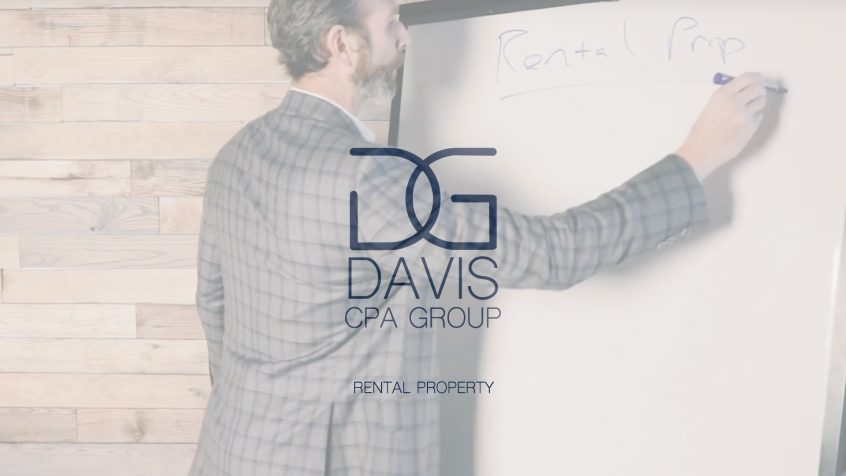Hi, Brandon Davis with Davis CPA Group. Today I want to talk a little bit about rental properties.
A lot of times I get asked questions about different types of investments that one might want to get involved in. I’ve got clients that have good sources of income, and they invest in the stock market, they invest in real estate in some different capacities.
But one of the ones that they often gravitate towards in the real estate area is rental property, and kind of what that looks like. And so, some of the questions I get relate to, “Well, what does that do to my tax return? If I have a loss, is that deductible? How do I track, and what information do you keep track of, when it comes time to do my tax returns?” We’re gonna talk through that a little bit today.
So, today’s topic is rental property. We’re gonna focus primarily on residential rental property, meaning the rental of a house, a duplex, apartment complex, residential rental property. Commercial rental property’s a little bit different, and it’s mostly just different in the way it’s depreciated.
So, residential rental property, in this fact [panel 00:01:04] we’re going to talk about today, let’s talk about a house. Let’s say we have a house we paid $150 thousand for. It was a house in a lot. And so, we had it appraised and we bought it. The house is worth 120 thousand, and the lot that it’s sitting on is worth 30 thousand, and this is information we need to know.
And so, I’ll explain to you why we need to know this information. So, you got a house worth 120, land worth 30, and you just paid 150 thousand for the whole thing. Well, that’s great. That’s step one.
Step two is, I gotta find a tenant, right? So, if I have a tenant, I get it leased out, and I’m going to lease this property out for, let’s say, $1000 per month in rental income. Well, okay, great. I bought a piece of property, I got a thousand dollars that I’m going to basically get a month for it, now what?
Well, you gotta figure out … You certainly want to put together a good lease agreement, and you want to get an attorney involved to do that, so that way you’re protected as far as your rights as the landlord and the tenant and such. You want to make sure that you open up a …
I generally recommend we open up a separate bank account, or some other way to track the activities you’re going to have associated with this property, because as you buy it, that’s step one, but you’re also going to have improvements that you make to it. Any major improvements that we make to it as we go along, may need to be what they call “capitalized” and depreciated, that they meed certain thresholds, both on the dollar amount, or the amount of work being done to the property to improve its useful life, meaning make it last longer.
Maybe additional costs that we’ve gotta add to the original cost basis. So, I want to talk a little about that basis. $150 thousand was your original cost. There’s another term for that, that’s used a lot of times in the tax world, called “basis.” So, your initial basis in this property is $150 thousand, 30 thousand in land, 120 in the house.
You’re going to take that land, and you’re going to capture that cost and maintain it over the life of your ownership of that property. The $120 thousand in the house cost, you get to depreciate. What that means is, you take the $120 thousand of cost associated with this property, and you depreciate it over time.
There’s rules in the tax world that dictate what that depreciation looks like. And so, on a residential rental property, it’s depreciated over 27.5 years, is what that looks like. Now, there’s some special rules that go a little deeper than that. It’s what’s called a “mid-month convention,” meaning we have to take a rate, depending on what month of the year it was placed in service, then we depreciate it based on that rate.
But, effectively, it depreciates fully over about 27.5 years. So, I’m not going to get into the [weeds 00:03:53] a little bit on that.
All right. So, we get to depreciate a piece of this property, meaning we get to push over … We have a thousand dollars a month in income, so it’s going to work out annually to be $12 thousand a year in rental income, if we have it rented the whole year. So now, we have to track our income, and then we track our expenses associated with this property.
Well, you may have utilities expense, so you want to track that and put that in here. You’re going to have property taxes. And utility expense, you may pass some of that on to the tenant, but you may cover some of those yourself. Again, your lease agreement is going to dictate some of that.
You’re going to have property taxes that you’re going to have to pay. You’re going to have insurance that you’re going to want to keep, and you’re going to want a good insurance agent and make sure you’re property insured on your property. So, you have that as an expense.
Any repairs or maintenance you do on the property, painting it, lawn maintenance, things of that nature, anything that you have associated with operating this rental as a business, if you will, because it is somewhat of a business, and we’re going to talk about that a little bit later …
But, anything associated with operating this rental property is a potential deduction against the rental income. The other thing you have to do over here, is you’re going to take depreciation expense. So, what ever the cost value is, divided by that ratio that gets us to that annual amount to deduct 27.5 years over the life of the asset, that’s going to come over here as a deduction.
If you borrowed money to buy this property … So, say for example, it was $150 thousand purchase price. You put half of it down, so you borrowed 75 thousand, and you pay interest on that loan, your interest expense will be a deduction down here. And so, you add up all these expenses against your income, and you get down here to your net income from the rental property.
And so, I want to start here, and kind of talk through, okay, what happens with this? This activity is reported on your personal tax return, if you hold the asset personally, or even if you held it in an LLC …
I’ve talked to you about LLCs before, it’s a way that you can set up to own real estate or assets or a business, and even if you owned it as an LLC, and we owned it as what’s called a single-member LLC, which we disregard for tax purposes …
You can find my video on LLCs, and you’ll see some more information about that. But, I you own this, personally or as a single-member LLC, this activity gets reported on your personal tax return on what’s called a “Schedule E.”
So, if you ever look at your personal tax return, you get it out and you look at page one, there’s all these line items, right? There’s a line, I think it’s line seven, it’s for wages, and you got interest and dividends, capital gains.
And then there’s a place where you put Schedule Cs for business income, Schedule F for farm, and there’s a place called “Schedule E,” and it says something in the nature of, “Income from S corporations, partnerships, real estate activities.” That’s where this gets reported. So, you add a schedule to your tax return, you report your income and your expenses, and that net number goes back to page one of your tax return, and gets added to all your income that you pay taxes on.
Well, I know you’re thinking, “Well, that’s great. I got more income I gotta pay taxes on. Okay. Well, how’s it taxed?” Well, it’s taxed as your ordinary income rates. It’s not subject to self-employment tax, like a sole proprietorship or a business would be, because it’s considered a passive activity. Rental property, by its nature, is considered a passive activity and not a business activity, so it’s not subject to self-employment taxes.
But also, these passive activity rules open up other things you gotta be thinking about, particularly when we go to a loss situation. So, let’s say for example, and I’m going to erase some things to kind of clean this up a little bit. Let’s say for example, that we went through this scenario, where we had our $12 thousand in rent, and we had all of our expenses.
So, we say, $12 thousand in rent, and this in on an annual basis. And say, our total expenses was $15 thousand, okay? And I just summarized that. So, this is your rent income, and these would be your expenses, and that 15 thousand in expenses includes your depreciation expenses from your cost basis of the property, interest expense on the loan, property taxes, all those things we discussed.
So, now I got a $3,000 loss, right? Well, this $3,000 loss goes to the front of my tax return on page one, and offsets my other sources of income in most cases. There’s always a caveat with tax law. So, what happens is, I get to take this passive loss against my other sources of income, unless my income is over certain thresholds.
If that’s the case, there’s passive activity loss rules that come into play, that may limit my loss. And so, my AGI, adjusted gross income, is over about $150 thousand, and I’m just talking eye level here, then I start getting to a point where I might get phased out of being able to deduct this loss.
And if that happens, I don’t lose the loss, it just carries forward until one of two things happens. I have positive income in this activity, frees up that loss and then reduces that taxable income in the future. Or, if I sell this activity. Say, for example, I’ve carried this thing for five years, I’ve lost money every year because I can’t anybody in the property, or I keep having to repair things.
And at the end of five years, you know what, I am done. I want out. Well, say, if I’ve lost 3,000 a year for five years, I’ve accumulated $15 thousand of losses, the year I sell out and dispose of the property, and I sell it for what ever I can get out of it, I pick up any gain or loss on what ever my adjusted basis is, and we’re going to talk about that at another time …
But, I sell the property. It frees up all my losses at that point in time. And so, that’s kind of how those passive activity loss rules work, and that’s really the big thing that is often a surprise for some people when it comes to rental properties.
Because I’ve had some clients that say, “Well, you know, I’m going to dump all this money into it, and get this big loss at the end of the first year. Won’t that give me a big tax savings?”
Well, it’ll give you some tax savings. Okay, there’s one more thing we gotta talk about. Even if you’re under the income limits, where you’re able to deduct this full $3,000, there another limitation at the max amount that you can deduct from rental property as a passive activity loss any one year, in $25 thousand.
And so, if this were to be a $30 thousand loss in year one, because of all the stuff we did to it, well, we’d be limited at 25 thousand, and five thousand would carry forward to the next year as a passive activity loss carried forward, to offset future income from the rental property.
That’s kind of the big thing about rental properties. Again, you know, they can be great investments, you’re obviously buying as asset that someone else is helping you pay for. Because, generally speaking, rental properties and real estate go up in value over time, and so it can be a great avenue to have some future retirement income.
It can be a great avenue to have some supplemental income. And use these to kind of build off each other to build a portfolio of rental properties. But, knowing these passive activity loss rules, knowing how to properly structure your rental properties, what things to keep track of from income and expense standpoint, is very important. And that’s where you want to get an professional involved to make some of the decisions, and walk through how to set these things up.
If you have any questions, please reach out to us at Davis CPA Group, and we’ll see you next time.


